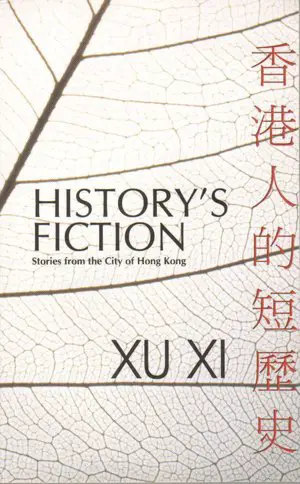 History’s Fiction – Stories from the City of Honk Kong is a collection of short stories by Xu Xi (originally named Xu Su Xi), a Chinese novelist and short story writer who lives in Hong Kong. She was born in 1954.
History’s Fiction – Stories from the City of Honk Kong is a collection of short stories by Xu Xi (originally named Xu Su Xi), a Chinese novelist and short story writer who lives in Hong Kong. She was born in 1954.
Until the Next Century is the short story that opens the collection. An elderly couple, a wealthy Beijing-born businessman and an independent woman from Hong Kong, put an end to their long-running affair at the turn of the millennium. His unexpected visit to her Hong Kong flat is dealt with coldness by the female protagonist, who, at the age of sixty, realizes the unfairness of their relationship.
The short story starts with the Chinese work quingfu, which bears the meaning of “love-wife” or “extra-marital lover.” It is the exact situation the woman has been into most of her life and her decision to break free from such a relationship with her sixty-eight years old former love, who still insists he has what it takes to play the role, comes as a shock to him. The woman proves to be a stronger and more confident character, being able to emotionally detach from their old memories and reason out what it’s best for her.
The story has a film-like quality, the narrative alternating in a series of flashbacks that flesh out their past, from the first time they met to his marriage and their past affair. The fact that soon after he leaves her apartment she gets ready for her New Year’s Eve party suggests that, with the new millennium, she will no longer accept the role of quingfu, thus readying herself for the freedom and “for the pleasures that were yet to come.”
Insignificant Moments in the History of Hong Kong presents the experiences of Yam Kuen and his Uncle Cheuk during the day before (June 30) and the actual day (July 1) which saw the return of Hong Kong to Chinese sovereignty in 1997. Both characters work in the service industries, the younger Yam Kuen in an upper-class club and Uncle Cheuk in a small restaurant. While the wealthy people in Hong Kong enjoy the fireworks and the historical moment, the uncle and the nephew have to go to work.
The narrative begins in the uncle’s restaurant, where Yam Kuen and the staff have a late lunch. Little by little, the topic of the conversation moves to the restaurant cat that is afraid of mice. But, the seemingly unimportant chit-chat is not just a way of connecting to the title of the story by describing insignificant moments in the life of working-class Hong Kong people. It is more than that.
Only a page before this dialogue, we can read Deng Xiao Ping’s (one of the most powerful Chinese communist leaders) words in the motto of the short story: “It doesn’t matter if a cat is black or white, as long as it catches mice.” What Xu Xi tried to do in this short story was to use Deng’s analogy and the cat that was afraid of mice to explain the difference between the Chinese and Hong Kong political systems under the One Country Two Systems scheme that was adopted in 1997.
Insignificant Moments in the History of Hong Kong also brings in reminiscences from the characters’ past. In this case, it is the recollection of Kuen’s first night in his uncle’s house in Hong Kong, where he was sent by his parents, who remained on Mainland China, at six years old. That night was the first night Kuen saw the rabbit in the moon: “Just when he was about to give up in frustration, the rabbit miraculously appeared, a dark outline against the light.” It is another insignificant moment in the history of Hong Kong, but one suggesting that, with patience, things will turn out to be just fine.
Blackjack is written in stream of consciousness style, and deals with the alienation felt by a woman living a life in two places: in Hong Kong and Brooklyn. Divorcing her American husband after a sixteen-year marriage, the narrator of the story, a Hong Kong native, has to deal with returning in Asia after such a long time: “Do you dream in colur or black and white? Cantonese or English? …I dream in psychedelic Chinglish, with bits of Putonghua hovering, in preparation for my future masters.”
The short story starts in Atalantic City casino, not long before the 1997 Hong Kong handover. “So what’s going to happen in 1997?” is what the writer wants to know in a life that resembles gambling, with an uncertain outcome. The second part of the story takes place in Hong Kong, to be more exact at the MRT exit to Tsimshatsui, a heavily urbanized area, where “everything is sleek and shiny, a never ending mirror of modernity.”
The end of the story suggest that what happens in our future life is more or less out of our control. The narrator suggests to seize the day, to life the moment, carpe diem, because “Sometimes you win, sometimes you lose.”
